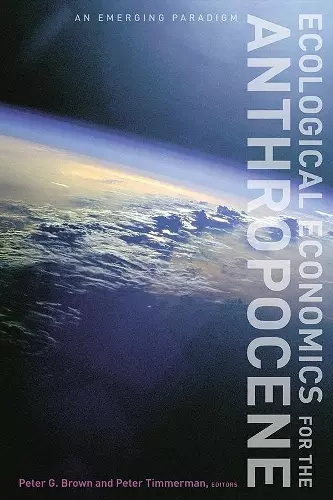Ecological Economics for the Anthropocene
An Emerging Paradigm
Peter G Brown editor Peter Timmerman editor
Format:Paperback
Publisher:Columbia University Press
Published:8th Sep '15
Should be back in stock very soon

Ecological Economics for the Anthropocene provides an urgently needed alternative to the long-dominant neoclassical economic paradigm of the free market, which has focused myopically-even fatally-on the boundless production and consumption of goods and services without heed to environmental consequences. The emerging paradigm for ecological economics championed in this new book recenters economics on the recognition of the fundamental physical and biological conditions for living on the Earth, requiring a deep reconfiguration of the goals of the economy, how we understand the fundamentals of human prosperity, and, ultimately, how we assess humanity's place in the community of beings.
Provides an urgently needed alternative to the dominant neoclassical paradigm of the free market, which has focused fatally on the boundless production and consumption of goods and services without heed to environmental consequencesEcological Economics for the Anthropocene provides an urgently needed alternative to the long-dominant neoclassical economic paradigm of the free market, which has focused myopically-even fatally-on the boundless production and consumption of goods and services without heed to environmental consequences. The emerging paradigm for ecological economics championed in this new book recenters the field of economics on the fact of the Earth's limitations, requiring a total reconfiguration of the goals of the economy, how we understand the fundamentals of human prosperity, and, ultimately, how we assess humanity's place in the community of beings. Each essay in this volume contributes to an emerging, revolutionary agenda based on the tenets of ecological economics and advances new conceptions of justice, liberty, and the meaning of an ethical life in the era of the Anthropocene. Essays highlight the need to create alternative signals to balance one-dimensional market-price measurements in judging the relationships between the economy and the Earth's life-support systems. In a lively exchange, the authors question whether such ideas as "ecosystem health" and the environmental data that support them are robust enough to inform policy. Essays explain what a taking-it-slow or no-growth approach to economics looks like and explore how to generate the cultural and political will to implement this agenda. This collection represents one of the most sophisticated and realistic strategies for neutralizing the threat of our current economic order, envisioning an Earth-embedded society committed to the commonwealth of life and the security and true prosperity of human society.
In Ecological Economics for the Anthropocene, ecological economists ask whether their insights are unfinished, as problematic as they are promising. Their challenges are provocative and insightful. With the planet in jeopardy, sustaining community and saving the biosphere is as vital, and morally required, as sustaining growth. -- Holmes Rolston III, Colorado State University Ecological Economics for the Anthropocene is about the relationship between life and the world that supports it. Three basic concepts-membership, householding, and entropic thrift-are used to explain this relationship and to demonstrate the strong connection between ecological economics and justice. -- Herman E. Daly, University of Maryland A nuanced and quite interesting set of contributions concerning the ethical dimensions of ecological economics, providing a transdisciplinary vision for governing the economy as an embedded subsystem of social and ecological systems. -- Richard Howarth, Dartmouth College We urgently need both a new ethic and a new economics to guide us into the Anthropocene Age. This timely collection underscores the challenges that any new ecological economics must overcome. It offers many rich resources, drawn from an impressively diverse range of disciplines, traditions, and cultures, to help philosophers, economists, and others as we try to imagine how life in the Anthropocene will transform our moral and economic thinking. -- Tim Mulgan, University of St Andrews and University of Auckland, author of Ethics for a Broken World
ISBN: 9780231173438
Dimensions: unknown
Weight: unknown
408 pages